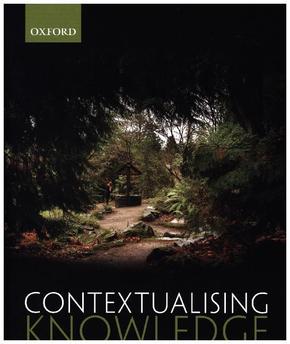
Contextualising Knowledge - Epistemology and Semantics
| Verlag | Oxford University Press |
| Auflage | 2017 |
| Seiten | 276 |
| Format | 16,2 x 24,0 x 2,1 cm |
| Print PDF | |
| Gewicht | 583 g |
| Artikeltyp | Englisches Buch |
| ISBN-10 | 0199682704 |
| EAN | 9780199682706 |
| Bestell-Nr | 19968270EA |
Jonathan Ichikawa synthesizes two prominent ideas in epistemology: contextualism about knowledge ascriptions, and the 'knowledge first' emphasis on the theoretical primacy of knowledge. He argues that in thinking clearly about knowledge, epistemologists must also think about the dynamic aspects of the words we use to talk about knowledge.
Jonathan Ichikawa develops a contextualist semantics for knowledge ascriptions, and shows how it can illuminate foundational questions in epistemology. He argues that in thinking clearly about knowledge, epistemologists must also think about the dynamic aspects of the words we use to talk about knowledge. Contextualising Knowledge defends a central theoretical role for knowledge in broader theorising - evidence, belief, justification, and assertion are all explained in part in terms of knowledge - but none of these connections can properly be understood or appreciated independently from the contextualist approach to knowledge ascriptions.
The book synthesizes two of the biggest ideas in contemporary epistemology: contextualism about knowledge ascriptions, and the 'knowledge first' emphasis on the theoretical primacy of knowledge. Ichikawa argues that the apparent tension between these ideas can be resolved-indeed, a central theme of the book is that each has something impor tant to offer the other. Ichikawa embraces contextualism, emphasizing careful attention to its epistemic assumptions and implications. The result is a novel take on central questions about knowledge and its roles in human life and discourse.
Inhaltsverzeichnis:
Introduction
1: 'Knowledge'
2: Sensitivity
3: Evidence
4: Justification
5: Action
6: Assertion
7: Belief
Rezension:
Ichikawa offers new and interesting accounts of counterfactuals, evidence, justification, the epistemic norms governing action and assertion, and the nature of belief; clarifies a host of issues surrounding epistemic contextualism; and makes important contributions to the debate about epistemic internalism. ... I thoroughly enjoyed the book, and learned much from reading it. It is filled to the brim with important clarifications, convincing objections, and creative proposals on each of the many topics it touches on. Bernhard Salow, Notre Dame Philosophical Reviews
